Latest News Archive
Please select Category, Year, and then Month to display items
14 June 2024
|
Story Anthony Mthembu
|
Photo Suplied
 Jeremiah Hlahla, a UFS student completing his PhD in Botany at the University of Debrecen as part of an exchange initiative funded by the Erasmus+ Mobility Programme.
Jeremiah Hlahla, a UFS student completing his PhD in Botany at the University of Debrecen as part of an exchange initiative funded by the Erasmus+ Mobility Programme.
As part of an exchange initiative facilitated by the Erasmus+ Mobility Programme, Jeremiah Hlahla, a student at the University of the Free State (UFS), is nearing the completion of his PhD studies at the University of Debrecen in Hungary. Hlahla’s journey, which began in February 2024 and is set to conclude in July 2024, has been a remarkable learning opportunity. “As a first time-traveller to Europe, I have thoroughly enjoyed engaging with people from different countries and cultures,” he said.
The benefits of international collaboration
Hlahla is currently pursuing a PhD in Botany, focusing on plant stress physiology. “My current PhD project investigates the physiological, biochemical and morphological responses of vegetable-type soybean, or edamame, to combined drought and heat stress,’’ he explained. He considers the University of Debrecen the ideal institution to complete his research due to its extensive expertise and resources in similar projects. He noted that his colleagues at Debrecen conduct significant work on plant protection against biotic and abiotic stresses, including salt and drought stress, as well as proteins and amino acids in barley and other legumes.
Given the vast knowledge available on similar projects, Hlahla has found substantial engagement with his work at the University of Debrecen. “Upon arrival, I delivered an introductory lecture presenting my UFS project on the synergistic effects of combined drought and heat stress on the physiology and biochemistry of edamame. It was an engaging session as everyone could relate to my work and asked many questions,’’ he said.
Insights gained from the exchange
Hlahla has also gained valuable lessons that will assist him in his research career, including biotechnology and physiology tools. “I learned how to prepare samples and use high-performance liquid chromatography (HPLC) and reversed-phase ultra-high-performance liquid chromatography (UHPLC) to quantify proteins and amino acids,’’ he said. These techniques are beneficial not only for his current work but will also support future soybean research.
As his experience at the University of Debrecen nears its end, Hlahla reflects on the collaborations and friendships he has formed, which stand out as a significant highlight.
Students’ commitment the focus of architectural exhibition at Free State Arts Festival
2016-07-07
 The traveling exhibition of first-year architecture
The traveling exhibition of first-year architecture
students of the Nelson Mandela Metropolitan
University consists of 400 exhibition pieces.Photo: Supplied
A unique travelling exhibition of over 400 pieces will be hosted by the UFS Department of Architecture from 11-23 July 2016. The exhibition, a project of the Nelson Mandela Metropolitan University (NMMU) School of Architecture is the first exhibition of its kind on this scale.
First exhibition of its kind
The architect Boban Varghese, the head of the Department of Architecture at NMMU, said that a series of projects furthering academic engagements are being implemented under his leadership. This travelling exhibition of first-year architecture students is one of these.
The NMMU School of Architecture is engaged in addressing architectural education that is appropriate and relevant as it responds to the contextual challenges shaped by local and global issues.
Students’ work received recognition
Besides being recognition of student work, which is normally confined within the walls of the Schools of Architecture, the aim of the travelling exhibition is not only to introduce the work to students of other Architecture Schools and the architecture profession itself, but also to share the discipline of architecture with a wider public. In this sense, the exhibition is an educational and cultural event.
This important aspect is manifested in the generous support of the UFS Department of Architecture in sponsoring the second exhibition during the Free State Arts Festival, as a collaborative project between two Schools of Architecture. A third exhibition of the work is foreseen in Johannesburg during the annual Architecture Students Congress at Wits later this year.
432 pieces part of research programme
The exhibition PALLADIO AND THE MODERN
is the first exhibition of its kind of first-year
architecture students’ work in South Africa.
The exhibition entitled PALLADIO AND THE MODERN shows the first two projects of the first-year students when they have just arrived from school with little experience in architectural drawings and in building architectural models. Their dedicated commitment to the task of producing 288 drawings and 144 models - a total 432 exhibition pieces - forms part of a three-year research programme (2013-2015) in architectural composition conducted by the Senior Lecturer in Architecture, Ernst Struwig, Dr Magda Minguzzi and Jean-Pierre Basson. All the work exhibited is done by hand.
In the exhibition, the 36 villas of the Renaissance architect, Andrea Palladio (1508-1580), initiate a dialogue with the 36 houses of 20th and 21st international and national architects in their reciprocal theme of exploring the language of architecture.
Visiting hours: Monday to Friday 09:00-16:00
Exhibition closes on 23 July 2016
Sponsors:
Department of Architecture UFS; NMMU; Stauch Vorster Architects; The Matrix Urban Designers and Architects Cc; Adendorff Architects and Interiors Cc; NOH Architects; Thembela Architects (Pty) Ltd; Erik Voight Architects; DMV Architecture, MMK Architects; IMBONO F. J. A. Architects CC; dhk Architects; LYT Architecture; B4 Architects.